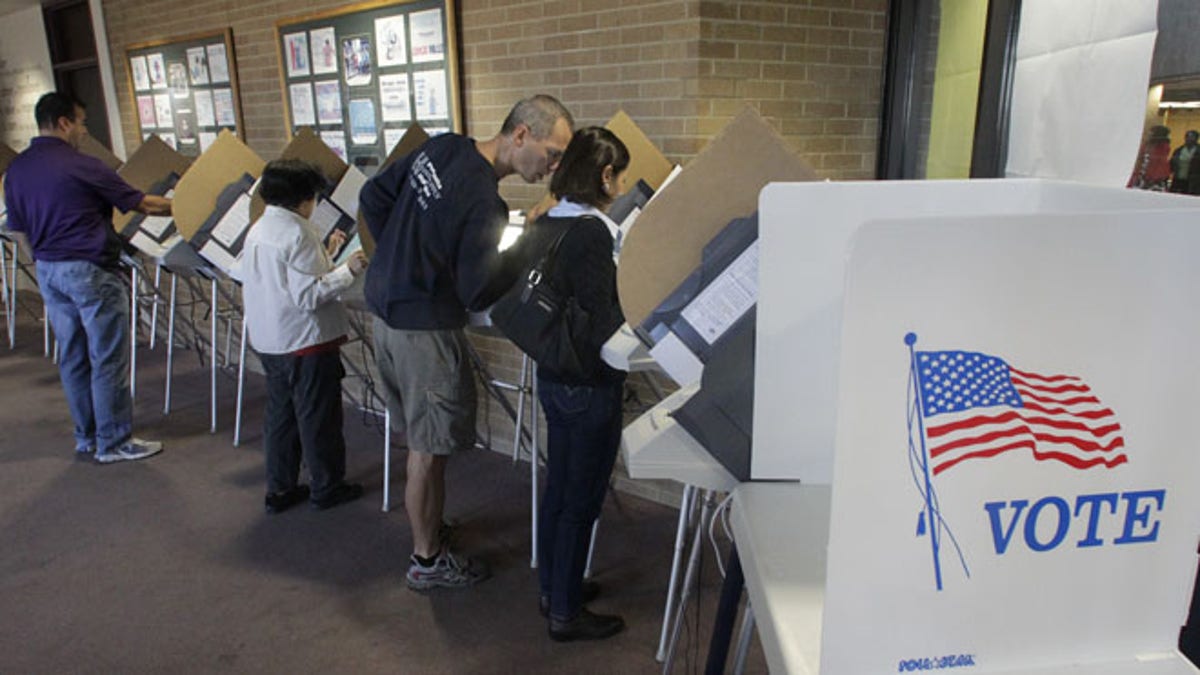
Oct. 30, 2012: People vote early at the Salt Lake County Government Building in Salt Lake City. (AP)
We like to bandy the idea of democracy around, promoting the value of elections and citizen involvement. But those features are not the primary intention of democracy. Instead, it is to promote deliberation, consideration which produces a broader perspective and more considered response.
Exercising the rights of our representative democracy – voting, free speech, etc. – is valuable only in as much as it produces said deliberation.
Alexis de Toqueville, whose insightful 19th century observations on American political life continue to bear fruit in contemporary analysis, noted that “liberty is an arduous apprenticeship.”
If you wish to assert your rights, you must respect the responsibilities that come with them.Electronic communications and social media only magnify the significance of these concerns.
Raise your hand if you are tired of the campaign stump speeches, political ads and phone calls. Listening to the visions of doom and gloom, the attack ads and general vilification for the competing visions of government posed by the parties and candidates this election cycle has deeply disappointed (though not surprised) me. These assertions are, at best, hollow and oversimplified and, at worst, misleading. But the problematic aspect is that some citizens take them as useful sources of information without understanding the fuller issues or verifying the claims. This problem arises for a number of reasons, two of which are particularly important.
Partisanship, a person’s attachment to a political party, is an emotional perspective, even for independents who “secretly” lean towards one side or the other. Certainly as humans, our emotions are an essential part of our being – i.e Plato noted the three integral parts of the human soul: rational, emotional and spirit. However, emotions should not guide important decisions, but rather focus our purpose. Some scholars have identified a cognitive purpose for partisan labels – providing a rational shortcut to understand politics – but this focus is not the contemporary use of party.
Emotional partisanship is compounded by another factor – selective perception, which is our human tendency to pay attention only to those sources which reinforce what we already believe. Study upon study reveals that public opinion is shaped by this force, rather than open interaction with multiple perspectives to pursue truth.
Over 40 years ago, Murray Edelman identified the role of symbolic politics – the influence of the public by impressions of general “malevolent and benevolent forces.” My research over the past decade on people’s evaluations of their representatives confirms that it is still the driving force. While we cannot expect citizens to become resident experts on all issues and policy responses, these symbolic responses do not make for an informed perspective.
The problems which our society faces are complex and thus require nuanced solutions. For example, government responses which assume that poverty is solely the result of circumstances beyond a person’s control or, conversely, solely someone’s fault, will miss the root causes of this issue. Like a physician that misdiagnoses an illness and provides a treatment that does not remedy the situation, voters and officials who are blinded by ideology will not promote decisions that address our nation’s social and economic problems. So how can we respond? By using appropriate skills of citizenship.
While the natural tendency to reject what doesn’t suit our current sensibilities is strong, a constructive and realistic skill is the use of critical thinking. Critical thinking, as defined by the Association of American Colleges and Universities (AAC&U), is “a habit of mind characterized by the comprehensive exploration of issues, ideas, artifacts, and events before accepting or formulating an opinion or conclusion.” In this process, voters can listen to multiple perspectives, identify valid evidence and make considered decisions which produce more effective outcomes. It is a far cry from the conversation and conflict that arises from emotional partisanship and selective perception.
Another important skill, which, in turn, influences critical thinking, is that of information literacy, “the ability to know when there is a need for information, to be able to identify, locate, evaluate, and effectively and responsibly use and share that information for the problem at hand” (AAC&U). It is difficult to make a significant evaluation of a problem and potential solution without valid sources of evidence. Relying on campaign ads or candidate statements, interest group emails or social media postings, without looking to other sources for perspective, leads us down a very problematic road.
In closing, I offer two challenges for readers. First, before you vote on Election Day, read a complimentary source about the candidate for whom you do not plan to vote and push yourself to see strengths in his/ her perspective – no current candidate will be the ultimate ruin of our country, if elected. Second, do not forward that e-mail or post that information on Facebook or Twitter without first checking a reputable source for its accuracy.
To do less would be doing a disservice to the values on which our country was founded; to do less will continue to mire our country in conflict and ineffective attempts to resolve our problems.
As citizens, we hold the power to maintain accountability of government. Let’s keep them accountable to propose actual solutions to the actual problems that we face.
